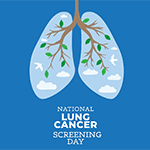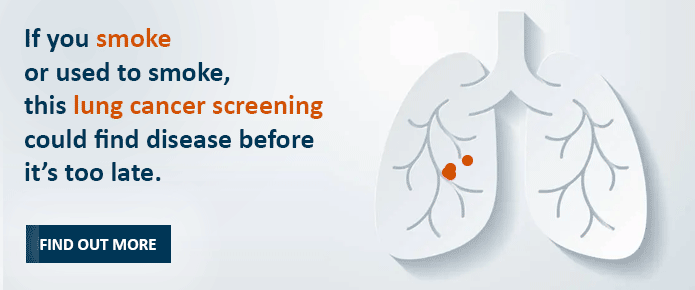
Lung cancer is the number one cancer killer of men and women in the U.S. Cigarette smoking is the leading risk for lung cancer, linked to at least 80% of lung cancer deaths.
All Smoking Raises Your Cancer Risk
Cigarette smoking is the number one risk factor for lung cancer, but other tobacco products such as cigars or pipes also increase your risk for lung cancer. The longer you smoke, the greater your risk.
Quitting Smoking Reduces Your Risk
Quitting smoking has immediate benefits to your health, and lowers your risk of heart disease and cancer over time. Ten years after quitting, your risk of cancer is about half that of smokers.
Other Lung Cancer Risk Factors
Secondhand Smoke: Smoke from other people's cigarettes, pipes, or cigars can also cause lung cancer. A smoke-free environment is the best way to keep your cancer risk low.
Radon: Radon, a naturally occurring gas from rocks and soil, is the second leading cause of lung cancer. Radon that enters buildings through cracks can accumulate in the air inside and increase their risk of lung cancer. Having your home tested, or getting a radon detector for your home can keep your risk low.
Personal or family history: Your risk of lung cancer may be higher if your parents, brothers or sisters, or children have had lung cancer. And if you have had lung cancer before, your risk is increased, especially if you smoke.
Diet: People who smoke and take beta-carotene supplements have increased risk of lung cancer. Arsenic and radon in drinking water (primarily from private wells) can increase the risk of lung cancer.
What You Can Do
Quit Smoking
Quitting smoking is the best step you can take to prevent lung cancer and heart disease. Free help with quitting is available through the Tobacco Quitline. Quitting has immediate and long-term health benefits for your health.
A few days after quitting: The carbon monoxide level in your blood drops to normal.
2 weeks to 3 months after quitting: Your circulation improves and your lung function increases.
1 to 2 years after quitting: Your risk of heart attack drops dramatically.
5 to 10 years after quitting: Your risk of cancers of the mouth, throat, and voice box (larynx) is cut in half.
Be Screened for Lung Cancer
Screening can detect signs of cancer early, before disease becomes advanced, and when it's easy to treat. Screening saves lives.
Screening is done by a low-dose CT. You are eligible for CT screening if you have a history of heavy smoking. Annual screening is recommended if:
- You are 50 to 80 years old,
- And you currently smoke, or have quit within the last 15 years,
- And you smoked an average of a 2 packs a day for 10 years. (The average number of packs smoked per day multiplied by the number of years you smoked is at least 20.)
If you are a smoker or ex-smoker, take this eligibility quiz:
If you think you are eligible for screening, talk to your doctor or a healthcare provider.
Resources
- Is lung cancer screening covered under your insurance? (American Lung Association)
- Lung Cancer Guide from the American Cancer Society
- Lung Cancer Screening (CDC)
- Mississippi Tobacco Quitline
1-800-QUIT-NOW - ACT Center for Tobacco Treatment

